The term ‘Prime Minister’ is used loosely to refer to the parliamentary Head of State- as other terms are used in Cambodian political history.
There are major gaps in some of the profiles- which are taken from French and English language sources. Some of the dates and days in office may not be totally correct. The names and dates in office are taken from WORLDSTATESMAN and may not always tally with other sources.
Cambodian post-independence politics was dominated by King, then Prince Norodom Sihanouk. Power, or the illusion of it, was often handed to, and removed from the ‘Democrats’, ‘Liberals’ and the ‘monarchists’- with Sihanouk as the dominant force.
This first part deals with the first 7 ‘Prime Ministers’ or the equivalent from the last months of World War II to 1949. This was an era where anti-colonial feelings were rising across the world- yet in Cambodia, most of the elite owed at least part of their privileged to France. There was a new-found feeling of optimism around the young King Sihanouk, and also caution from some of the more conservative in society. Armed struggle- at first against the French was fermenting in the north of Cambodia, as well as Vietnam- sowing the seeds of later conflict.

Norodom Sihanouk
18 Mar 1945 – 13 Aug 1945: 148 days
28 Apr 1950 – 30 May 1950: 32 days
16 Jun 1952 – 24 Jan 1953: 222 days
7 Apr 1954 – 18 Apr 1954: 11 days
3 Oct 1955 – 4 Jan 1956: 93 days
1 Mar 1956 – 3 Apr 1956: 33 days
15 Sep 1956 – 15 Oct 1956: 30 days
9 Apr 1957 – 27 Jul 1957: 109 days
10 Jul 1958 – 18 Apr 1960: 638 days
17 Nov 1961 – 6 Aug 1962: 293 days
Total: 1609 days
King Norodom Sihanouk is credited as being the first ‘Prime Minister’ of Cambodia during the last weeks of World War II. He abdicated the throne in 1955, and therefore able directly participate in politics. His legacy is enough to fill several volumes of books- and is still a revered, if undoubtedly flawed, figurehead.
Son Ngoc Thanh
14 Aug 1945 – 16 Oct 1945: 63 days
18 Mar 1972 – 14 Oct 1972: 210 days (total 273 days)
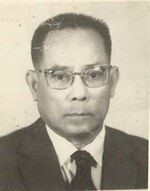
Son Ngoc Tanh, born in 1908, was a Cambodian nationalist and republican politician, with a long history as a rebel and (for brief periods) a government minister.
Thanh was born in Travinh, Vietnam, to a Khmer Krom father and a Chinese-Vietnamese mother. He was educated in Saigon, Montpellier and Paris, studying law for a year before returning to Indo-China.
He found work as a magistrate in Pursat and as a public prosecutor in Phnom Penh before becoming Deputy Director of the Buddhist Institute. Along with another prominent early Khmer nationalist, Pach Chhoeun, he established the first Khmer language newspaper, Nagaravatta, in 1936.
Thanh was anti-colonialist, and receptive to Japanese fascism, or as he termed it “National Socialism”. Thanh’s ideology was essentially republican, right-wing, and modernising in outlook, which was to make him a longstanding opponent of the King Norodom Sihanouk. Despite his nationalism, he was also a strong advocate of pan-Asian cooperation, and advocated the teaching of the Vietnamese language in Cambodian schools, as it was a potential conduit for modernising ideas.
After demonstrations against the French in July 1942, Thanh fled to Japan, returning when Sihanouk declared Cambodia’s independence on March 12, 1945, during the Japanese occupation.
He was made Foreign Minister, and in August, with the surrender of Japan, Thanh made himself Prime Minister. With the restoration of French control in October, he was arrested, and sent into exile first in Saigon and then in France. Many of his supporters joined the Khmer Issarak resistance to fight the colonial power.
He returned again in 1951, and quickly left for the north to work with right-wing Issarak groups.
Twenty years later, he reappeared as Prime Minister again in the Khmer Republic under Lon Nol. (18 Mar 1972 – 14 Oct 1972). Thanh was exiled to Vietnam after being fired by Lon Nol, and was arrested after the Communist victory in 1975, and died in Vietnamese custody in Chi Hoa Prison in Ho Chi Minh City due to illness on August 8, 1977.
Prince Sisovath Monireth
17 Oct 1945 – 15 Dec 1946: 424 days
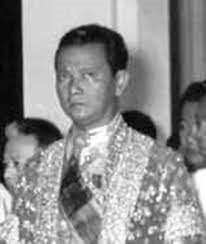
Prince Sisowath Monireth was a Prime Minister during the French protectorate period- from October 17, 1945 to December 15, 1946. Born November 25, 1909, he was the son of King Sisowath Monivong and Queen Kanviman Norleak Tevi. Although the most senior member of the Sisowath royal bloodline of the royal family at the time, he was passed over for the throne by the French authorities in favor of Norodom Sihanouk, whom they considered to be more pliable. The prince, however, remained heir to the throne under Sihanouk’s reign.
He did his secondary studies in Nice (1927-1930) in France under the tutelage of François Baudoin, former Senior Resident in Cambodia and personal friend of the King. He continued his graduate studies at the Special Military School of Saint-Cyr.
He returned to Cambodia in 1934 and became Secretary General of the Royal Palace
He fought as part of the 5th Infantry Regiment of the French Foreign Legion during World War II, including in the Battle of France in 1940. Returning to Cambodia, he was later put under house arrest in Kampot by the French for his suspected ties to Son Ngoc Tanh’s anti-French revolt, before he was released in March 1945.
One of his first acts as Prime Minister was to create the first modern Cambodian army. Having won the consent of the French, who had recently returned to post-war Cambodia, Prince Monireth formed an indigenous army whose mission, according to the Franco-Khmer Military Convention of November 20, 1946, was to uphold the sovereignty of the king, to preserve internal security, and to defend the frontiers of the country.
In later years, Prince Monireth temporarily acted as Head of State from April 6 to June 13, 1960 in his capacity as chairman of the Regency Council.
From March to May 1973, he placed under arrest by the Government of the Khmer Republic.
During the fall of Phnom Penh by the Khmer Rouge, he sought asylum at the French Embassy in Cambodia which refused him entry. He disappeared in September 1975, presumably executed by the Khmer Rouge.
Prince Sisovath Youtevong
15 Dec 1946 – 17 Jul 1947: 214 days
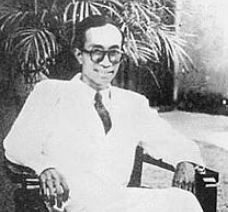
Prince Sisowath Youtevong was a Cambodian prince, politician and mathematician, often credited as the “Father of Cambodian Democracy”.
He was the first elected prime minister, after the French allowed limited political autonomy.
Sisowath Youtevong was born in 1913 in Udong- the son of Prince Chamraengvongs and Princess Sisowath Yubhiphan. He studied at a science university in France and received a certificate of mathematics in 1941. He was also a member of the French Section of the Workers’ International, the predecessor to the present-day Socialist Party. He was elected as President of the newly founded Democratic Party of Cambodia in April 1946. Youtevong was the principal author of the constitution, which was put to use on 6 May 1947. He led the Democratic Party to victory in the elections on 1 September 1946 and was sworn in as Prime Minister on 15 December 1946.
He died on 17 July 1947, aged 33 or 34 (his exact birthday was not recorded).
“France has joined in so many fervent tributes. Its representative in Indochina magnified the role of the one who was a French-speaking Khmer, faithful to his race, faithful to his faith and in love of the country which, through its language and its culture, had revealed it to itself “
Prince Sisowath Watchayavong
25 Jul 1947 – 20 Feb 1948: 210 days
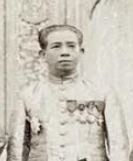
The third consecutive Sisowath to hold the office, Watchayavong was born on September 13, 1891 in Phnom Penh, son of Prince Sisowath Wathanavong and Neak Moneang Sbay Roeung. He married his first wife on February 2 1921- Her Royal Highness Sisowath Saopha Ruongsi and had four children: Gauthavi, Aditi, Suchima, Devamith and Suprabha.
After his baccalaureate, he studied at the School of Political Sciences. He became Magistrate and obtained several decorations: Grand Officer of the ORC, Officer of the Legion of Honor, Monisaraphon, Srivathara.
He was President of the Council of Ministers from July 25 1947-February 20 1948. He was later appointed member of the High Council of the Kingdom in 1967.
He married several times and had 25 children. He lived in Phnom Penh until his death on January 30, 1972.
Prince Watchayavong had a very rich personal library and also preserved Cambodian manuscripts including the sastrà of the Cambodian Ràmàyana epic (Khmer Reamker).
Chhean Vam
20 Feb 1948 – 14 Aug 1948: 176 days
Chhean Vam was born on April 19, 1916 in Battambang, obtained his baccalaureate in 1938 and his degree in philosophy from the University of Paris in 1941. His wife Thiounn Thieum, granddaughter of Chauvea Thiounn, was sister of Khmer Rouge leaders Dr. Thiounn Thoeun, Thiounn Mumm and Thiounn Prasith.
He was one of the founders of the Democratic Party in 1946.
It was during his time in office, on June 4, 1949, that French Cochinchina or Kampuchea-Krom- 67,700 km² of land that had once been part of Cambodia- was formally ceded to the Vietnamese by the French authority after a decision made in Palais des Bourbons.
He died on January 19, 2000 in Paris.
Samdech Penn Nouth:
15 Aug 1948 – 21 Jan 1949: 159 days
24 Jan 1953 – 22 Nov 1953: 302 days
18 Apr 1954 – 25 Jan 1955: 282 days
17 Jan 1958 – 24 Apr 1958: 97 days
28 Jan 1961 – 17 Nov 1961: 262 days
17 Apr 1975 – 4 Apr 1976: 353 days (Total 1,455 days)
(Not counting period as PM of GRUNK government in exile 1970-75)
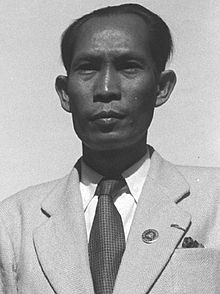
Penn Nouth was a prominent Cambodian politician and served as Prime Minister multiple times.
He was very close to Norodom Sihanouk- whom he followed after his exile to Beijing in 1970- and returned to be the Head of State after the fall of Phnom Penh in 1975.
Penn Nouth was born April 15, 1906 in Phnom Penh to a family of senior officials- including provincial governors.
Entering the Cambodian School of Administration, he graduated in 1935, and in September 1938, he was sent for an internship in Paris, at the Ministry of the Colonies to complete his training.
When World War II broke out in September 1939, he returned to the Cambodian administration as deputy governor of Kandal province, the governor being Ung Hy.
At the end of 1940, he was appointed chief of staff of Ung Hy, who became Minister of the Interior and of Worship.
On March 9, 1945, when the Japanese army decided to overthrow the French colonial administration, Ung Hy became Minister of Finance in the new royal government led by Norodom Sihanouk, and Penn Nouth became the Deputy Minister of Finance.
On August 14, 1945, when Son Ngoc Thanh took over as head of government- which only lasted a few months- Penn Nouth was made interim finance minister.
On October 16, 1945, he was appointed governor of Kompong Cham province, responsible for managing anti-French riots at the rubber plantations of Chup and Memot. On March 11, 1946, he returned to Phnom Penh where he assumed the post of governor of the city on December 15, 1946.
He briefly took the post of Prime Minister, from August 15, 1948 to 15 January 1949.
On September 30, 1949, he was appointed by Norodom Sihanouk member of the Council of Regency during the King’s stay in France, and from 1950, he was private adviser to the king “having rank, prerogatives and salary of a Minister of State of the Royal Government “.
He was appointed Minister of National Defense on May 9, 1950, and participated in June of the same year at the Pau conference, responsible for settling technical and legal issues pending between the French government and the Associated States of Indochina, in the context of a transfer of limited sovereignty.
On January 24, 1953, as part of his moves for independence, Norodom Sihanouk appointed Penn Nouth Prime Minister and gave him the command of the Khmer Royal Army before going into exile in Siam.
In March of the same year, he joined the king in Paris to start talks with the French government and in July, he led the negotiations from Phnom Penh with the colonial authorities. On November 9, 1953, Cambodia’s independence was finally recognized, ending a 90-year subjugation that began with the protectorate treaty of August 11, 1863.
From 1955, Penn Nouth became a central figure in Cambodian political life. He was alongside Norodom Sihanouk, during the creation of the Sangkum Reastr Niyum and the Bandung Conference, and was Primes Minister for several periods.
In June 1958, he became ambassador to Paris until January 1961 when he returned to Cambodia to be Prime Minister again from January 28, 1961 to November 17, 1961.
He held the office of Prime Minister for the sixth time from January 31, 1968 to August 14, 1969.
On March 18, 1970, when Norodom Sihanouk was deposed by Lon Nol, he joined the monarch in his exile and served as his prime minister in the Kampuchea Royal Unity Government operating from Beijing.
On April 17, 1975, when the Khmer Rouge took power he became Prime Minister for the final time, until April 4, 1976, but without exercising any power. He was later placed under house arrest, like Norodom Sihanouk, but following the Vietnamese invasion, he returned to China.
He emigrated to France, first to Champs-sur-Marne then to Châtenay-Malabry where he obtained his refugee status on March 6, 1981 and where he died on May 18, 1985, aged 80.
His obituary (translated from French) by Bernard Hamel.
PÈNN NOUTH (1904-1985)
It is with deep sorrow that Cambodians living in France and their French friends learned of Samdech Penn Nouth’s demise, at his home in Châtenay-Malabry on May 18, 1985 in his 81st year. With him disappears a prominent figure in Cambodian political life, a nationalist entirely devoted to the interests of the country and who will remain an example of perfect integrity for future generations.
Over the course of his long career, Samdech Penn Nouth has repeatedly held top positions. He was, in particular, seven times Prime Minister between 1948 and 1968. He represented Cambodia in France from 1958 to 1960. He had been appointed private adviser to Prince Norodom Sihanouk, then head of state, in 1969. By spirit of loyalty, he followed him into his exile in Beijing in 1970. But he soon distanced himself from the “Grunk” (royal government in exile), which was increasingly dominated by the Khmer Rouge. A refugee in France since 1979, Samdech Penn Nouth no longer played an active role due to his state of health. But he had always shown his sympathy for the anti-Hanoi nationalist resistance, to which his sons made a valuable contribution. He was himself a member of the “Council of the Wise”, of the “National Front for the Liberation of the Khmer People” (F.N.L.P.K.) chaired by Mr. Son Sann, former Prime Minister before 1970.
Samdech Penn Nouth’s funeral took place on May 24 at the crematorium of Villetaneuse, where he was cremated according to Buddhist custom.
Many Khmer and foreign personalities made a final tribute to the deceased by attending the funeral ceremony. The passing of Samdech Penn Nouth has been felt as a great loss by all Khmer Nationalists, for whom the deceased will be remembered as a valued statesman who devoted his entire life to the service of his country. The greatest grief at the end of his life was certainly not being able to end his days in Cambodia.“

5 thoughts on “Cambodian Prime Ministers 1945-49”